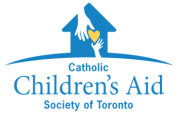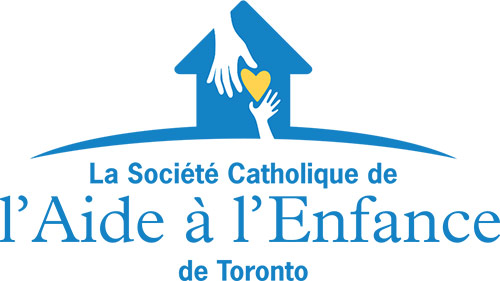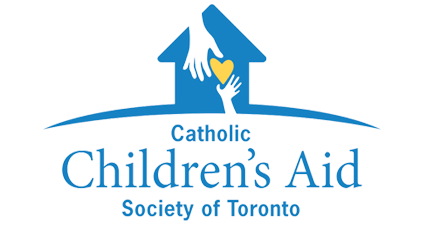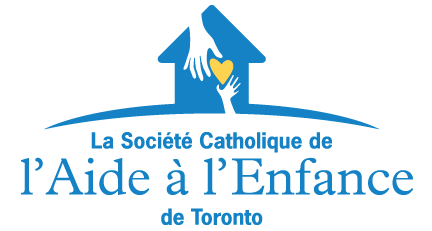Protection Services
Protecting Children and Youth
When a call is received, the role of the Catholic Children’s Aid Society of Toronto (CCAS) is to gather information, assess, investigate, and provide support to families, children, and youth.
CCAS child protection workers use a professional, strength-based, and equity-infused lens to assess and determine whether our involvement is required. Workers also assess whether connection to community-based services would better support a family to address concerns they may have.


At CCAS, we believe we all share a responsibility to protect children from harm.
If you have concerns regarding the well-being and/or safety of a child or young person, you have a responsibility to promptly call a Children’s Aid Society. At the time of a call, you are not required to prove that a child’s well-being, and/or safety has or could be compromised.
Professionals who work with children, such as teachers, childcare workers and doctors have a special duty to report concerns of child safety and well-being to a Children’s Aid Society.
Did you know that the agency will respond to concerns about other caregivers?
Community Caregivers like athletic coach, youth group leader, priest, teacher, camp counsellor, etc. Call us if you have questions.
Learn more about your responsibility to share concerns and how you can support children’s well-being and safety in the below section.
Help support Child Safety and Well-Being
Children and young people’s well-being and safety must be a priority for everyone in Ontario. As the most vulnerable members of society, they deserve a life that is safe and stable.
Do you know that we ALL have a duty to report concerns around child/youth safety and well-being?
The Child, Youth and Family Services Act is clear on the civic responsibilities of ordinary citizens and their duty to report any concerns of child safety and well-being to Children’s Aid Societies. There is a special responsibility on the part of professionals who work with children such as teachers, childcare workers and doctors to report concerns of abuse and neglect to Children’s Aid Societies.

Please help support children and youth’s well-being and safety by calling us at 416-395-1500 if you are concerned.
- When you call us with your concerns about a child’s safety and well-being, we gather as much detailed information from you about the concern to adequately assess and determine whether child welfare involvement is required. At the Catholic Children’s Aid Society of Toronto, we value working in a collaborative manner with families, children, and youth. As part of our assessment, we may need to speak with a child, youth, parents/caregivers, health care providers, school official, etc. It is our goal to determine what the appropriate needs and supports for a family may be.
- If we determine that Society involvement is not required, we will review community-based services that are racially and culturally specific with the caller and the family. These services include: crisis management, mental health treatment, counselling, training in safe parenting skills, and other supports.
- Since children are adversely impacted by domestic violence/woman abuse, we work collaboratively with the families and connect them to services in promoting healthier and protective relationships.
If are a parent or caregiver and need support – you can call us. Please refer to our Support Services to learn more.
- We strive to keep children connected in the home with their families and communities, while we work with families.
- Where there are concerns about a child’s safety within the home, CCAS will work with the family and support network to address the concerns. This may include court involvement, depending on the situation.
- If necessary, we may seek a court order to place children in the temporary care of relatives or friends or foster caregivers.
- We place a high value on a child’s connections with their extended family and cultural needs when planning for the safety of a child.
Involving You. Nothing About You Without YOU!
- Here at CCAS we value collaboration. We respect and value the voice of the child, youth, and family. We work together with families, their support network, and community-based partners. We actively involve children and families in planning the care and service they receive from us.
- We bring children, youth, caregivers, their extended families, community members, and other professionals together to discuss concerns and identify solutions by building upon family strengths.
Who Should Call Us?
Members of the Public & Professionals:
We all share a responsibility to ensure the safety and well-being of children, and to protect them from harm. Whether you are a parent, friend, neighbour, or a professional who comes in contact with children and youth, it is your duty to report child safety and well-being concerns.
Children and Youth:
If you are a child or a youth and you need someone to speak with regarding concerns for your safety and well-being, we are here to help you — and we will help support you and your family.
Or if you have a friend that you think is hurt or scared, you can call us, and we will help. Even if you have been told not to tell, you should call us. We are here to listen, and help.
Being hurt physically, emotionally, and/or sexually is NOT okay, and you have the right to tell someone if you are being hurt like this. It is never your fault.
We are here to help you.

Did You Know?
- We accept anonymous calls from non-professionals, such as neighbours or friends.
- When you call us with a question or concern, a trained child protection worker will answer your call, and listen carefully to your concerns so that we can be of help.
- Many calls are resolved over the telephone by a child protection worker because it is determined that there is a low level of risk to the child. We can often help families through referrals to a community partner/agency or with guidance from the CCAS worker.



